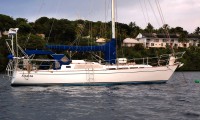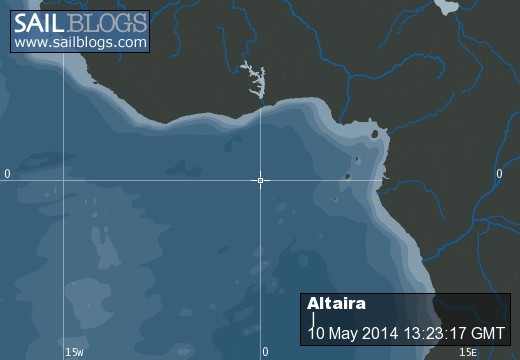Profile

Who: Kimball Corson. Text and Photos not disclaimed or that are obviously not mine are copyright (c) Kimball Corson 2004-2016
Port: Lake Pleasant, AZ
Altaira Wandering the Oceans
Favorites
- 7 Seas Cruising Association
- American Sailing Association
- Buoyweather Service
- CDC Traveler's Heath Advisories
- Cruiser Log venue
- Cruisers Forum
- Cruising Club of America
- Cruising Resources
- Cruising World Magazine
- Earthrace World Record
- Economic and Financial Indicators
- Economist Magazine
- Equipmment and Boat Reviews
- Float Plan Form
- Greenpeace Int'l
- Grib File Access
- Heavy Weather Sailing
- IMS Certificates
- Inland Travel: Expedia
- Intrade Prediction Markets
- Latitude 38
- London Financial Times
- Marine Books and Charts
- Marine Radios
- Nature Conservancy for Oceans
- New York Times
- NOAA Hurricane Analysis
- NOAA Weather Forecasts
- Noonsite, World Cruisng Info
- Ocean Cruising Club
- Overseas Mail Forwarding Services
- Practical Sailor Magazine
- RGE Economic Monitor
- Sail Gear Source I
- Sail Gear Source II
- Sail Gear Source III
- Sail Gear Source IV
- Sailboat Selection for Offshore Use
- Sailboats for Sale
- Sailing Items Sources Links
- SailMail (Marine Radio)
- Sailnet Sailing Information
- Seeking Alpha
- Tide & Current Program
- Tide Prediction Programs
- Tides & Currents
- TruthDig in the News
- U.S. Sailing Association
- Univ of Chicago Law Faculty Blog
- US State Dept Travel Advisories
- Voyage Planning (with pilot charts)
- Wall Street Journal
- Washington Post
- Weather.com
- Weather: MagicSeaweed
- Weather: Wetsand
- WinLink (Ham Radio)
- World Clock + Time Zones
09 April 2018 | Pago Pago, American Samoa
10 March 2018 | Pago Pago, American Samoa
10 March 2018 | Pago Pago, American Samoa
10 March 2018 | Pago Pago, American Samoa
22 August 2017 | Pago Pago, American Samoa
22 August 2017 | Pago Pago, American Samoa
22 August 2017 | Pago Pago, American Samoa
22 August 2017 | Pago Pago, American Samoa
22 August 2017 | Pago Pago, American Samoa
22 August 2017 | Pago Pago, American Samoa
22 August 2017 | Pago Pago, American Samoa
22 August 2017 | Pago Pago, American Samoa
22 August 2017 | Pago Pago, American Samoa
22 August 2017 | Pago Pago, American Samoa
22 August 2017 | Pago Pago, American Samoa
22 August 2017 | Pago Pago, American Samoa
22 August 2017 | Pago Pago, American Samoa
22 August 2017 | Pago Pago, American Samoa
22 August 2017 | Pago Pago, American Samoa
09 August 2017 | Pago Pago, American Samoa
The Important Implication of the Cambridge Capital Debate
06 July 2016 | Pago Pago, American Samoa
Kimball Corson

(economic wonk alert - tough subject matter at the edge)
The debate was between economists at Cambridge University and some at MIT or Cambridge, Massachusetts from about 1950 to about 1970. It related to the nature of capital, its remuneration and how to aggregate it for macro production functions. Was it a fluid money input (US) or was it a wild array of different manufacturing equipment and techniques that has no common denominator and could not be aggregated for use in a production function(UK)?
Nearly everyone accepts that the UK technically won the debate on the aggregation point, something Paul Samuelson acknowledged early on. In the short run, capital is fixed as an aggregate pile of dissimilar equipment. In the long run, capital is a fluid, variable money input, not fixed at all and relative unlimited in supply, unlike the case for other factor inputs. In my view, this has serious implications and consequences for the marginal productivity factor remuneration of capital and indeed labor.
The capital debate goes to the very idea of capital and its remuneration. Classical political economy authors, from William Petty to Karl Marx, including Quesnay, Smith and Ricardo, treated the process of production as a circular one. In this view, capital is "a produced means of production," rather than a factor of production fixed in supply, at least in the short run, used to produce final goods.
The most important result of the debate is that, once capital is defined as a produced means of production, there is now no direct relation between the relative abundance or scarcity of capital (relative to say labor) as a means of production and thus the marginal productivity theory of value for its remuneration becomes compromised by political intervention, at least in the long run when plant and equipment are variable. Distribution to factors of production becomes not governed by supply and demand and relative scarcities because of such political intervention to negate capital's naturally low remuneration due to its relative abundance.
Typically, it is assumed that the capital debates relate simply to problems of aggregation, and whether the use of aggregate production functions and aggregative measures of capital were still justifiable, even for simplicity's sake. However, contrary to this viewpoint, in my view, the capital debates did not rest just upon the possibility of building aggregate measures, but on more important issues.
Since the Marginalist Revolution, and the rise of the so-called neoclassical school, the notion that relative prices are determined by supply and demand, and that these reflect the relative abundance or scarcity of all goods and services - including factors of production - became consensual. As a result, the supply and demand for capital became the determination for the remuneration of capital. The more abundant is capital, the lower its remuneration, and vice versa if it is scarce. Conflict had no role to play in the determination of distribution, and political and social issues vanished entirely from analysis.
Because the supply of money is substantially unlimited, because capital formation entails multiple factors of production being used, because of multiple substitution effects exist for those factors and because of the technological effects of innovation, the supply of capital itself in truth is substantially unlimited, unlike other production factors, especially in a low interest rate environment. Relative scarcity is less a concern for capital than it is for other factors, especially labor at full employment.This relative super abundance of capital should lead to its relatively less remuneration under marginal productivity factor pricing, but that is not what we now observe.
Instead, we observe US corporate management misappropriating by fiat most of labor's increased marginal productivity gains to capital since about 1973, due to the fact it can and management controls the corporate revenue stream, This is a counter and political move due to capital's reduced marginal factor productivity because of its relative super abundance, destroying marginal productivity factor pricing for capital and for labor, substituting corporate political muscle instead. Little consensual is left.
Capital or corporate management does not like the consequence of marginal productivity pricing for capital and if confronted would argue why should the costly supply of more capital increase labor's remuneration and reduce capital's. There is no economic justice in that. This is why in the US since 1973, we see corporate management misappropriating labor's increased productivity remuneration, tossing marginal productivity pricing for capital and labor out the window and also rewarding themselves more handsomely at the same time. We have political intervention in factor pricing.
Few seem to grasp the real implications and relevance of the key aspect of the Cambridge capital debate itself.
The debate was between economists at Cambridge University and some at MIT or Cambridge, Massachusetts from about 1950 to about 1970. It related to the nature of capital, its remuneration and how to aggregate it for macro production functions. Was it a fluid money input (US) or was it a wild array of different manufacturing equipment and techniques that has no common denominator and could not be aggregated for use in a production function(UK)?
Nearly everyone accepts that the UK technically won the debate on the aggregation point, something Paul Samuelson acknowledged early on. In the short run, capital is fixed as an aggregate pile of dissimilar equipment. In the long run, capital is a fluid, variable money input, not fixed at all and relative unlimited in supply, unlike the case for other factor inputs. In my view, this has serious implications and consequences for the marginal productivity factor remuneration of capital and indeed labor.
The capital debate goes to the very idea of capital and its remuneration. Classical political economy authors, from William Petty to Karl Marx, including Quesnay, Smith and Ricardo, treated the process of production as a circular one. In this view, capital is "a produced means of production," rather than a factor of production fixed in supply, at least in the short run, used to produce final goods.
The most important result of the debate is that, once capital is defined as a produced means of production, there is now no direct relation between the relative abundance or scarcity of capital (relative to say labor) as a means of production and thus the marginal productivity theory of value for its remuneration becomes compromised by political intervention, at least in the long run when plant and equipment are variable. Distribution to factors of production becomes not governed by supply and demand and relative scarcities because of such political intervention to negate capital's naturally low remuneration due to its relative abundance.
Typically, it is assumed that the capital debates relate simply to problems of aggregation, and whether the use of aggregate production functions and aggregative measures of capital were still justifiable, even for simplicity's sake. However, contrary to this viewpoint, in my view, the capital debates did not rest just upon the possibility of building aggregate measures, but on more important issues.
Since the Marginalist Revolution, and the rise of the so-called neoclassical school, the notion that relative prices are determined by supply and demand, and that these reflect the relative abundance or scarcity of all goods and services - including factors of production - became consensual. As a result, the supply and demand for capital became the determination for the remuneration of capital. The more abundant is capital, the lower its remuneration, and vice versa if it is scarce. Conflict had no role to play in the determination of distribution, and political and social issues vanished entirely from analysis.
Because the supply of money is substantially unlimited, because capital formation entails multiple factors of production being used, because of multiple substitution effects exist for those factors and because of the technological effects of innovation, the supply of capital itself in truth is substantially unlimited, unlike other production factors, especially in a low interest rate environment. Relative scarcity is less a concern for capital than it is for other factors, especially labor at full employment.This relative super abundance of capital should lead to its relatively less remuneration under marginal productivity factor pricing, but that is not what we now observe.
Instead, we observe US corporate management misappropriating by fiat most of labor's increased marginal productivity gains to capital since about 1973, due to the fact it can and management controls the corporate revenue stream, This is a counter and political move due to capital's reduced marginal factor productivity because of its relative super abundance, destroying marginal productivity factor pricing for capital and for labor, substituting corporate political muscle instead. Little consensual is left.
Capital or corporate management does not like the consequence of marginal productivity pricing for capital and if confronted would argue why should the costly supply of more capital increase labor's remuneration and reduce capital's. There is no economic justice in that. This is why in the US since 1973, we see corporate management misappropriating labor's increased productivity remuneration, tossing marginal productivity pricing for capital and labor out the window and also rewarding themselves more handsomely at the same time. We have political intervention in factor pricing.
Few seem to grasp the real implications and relevance of the key aspect of the Cambridge capital debate itself.
Comments
| Vessel Name: | Altaira |
| Vessel Make/Model: | A Fair Weather Mariner 39 is a fast (PHRF 132), heavily ballasted (43%), high-aspect (6:1), stiff, comfortable, offshore performance cruiser by Bob Perry that goes to wind well (30 deg w/ good headway) and is also good up and down the Beaufort scale. |
| Hailing Port: | Lake Pleasant, AZ |
| Crew: | Kimball Corson. Text and Photos not disclaimed or that are obviously not mine are copyright (c) Kimball Corson 2004-2016 |
| About: | |
| Extra: |
Altaira's Photos - Main
No items in this gallery.
Profile

Who: Kimball Corson. Text and Photos not disclaimed or that are obviously not mine are copyright (c) Kimball Corson 2004-2016
Port: Lake Pleasant, AZ
Altaira Wandering the Oceans
Favorites
- 7 Seas Cruising Association
- American Sailing Association
- Buoyweather Service
- CDC Traveler's Heath Advisories
- Cruiser Log venue
- Cruisers Forum
- Cruising Club of America
- Cruising Resources
- Cruising World Magazine
- Earthrace World Record
- Economic and Financial Indicators
- Economist Magazine
- Equipmment and Boat Reviews
- Float Plan Form
- Greenpeace Int'l
- Grib File Access
- Heavy Weather Sailing
- IMS Certificates
- Inland Travel: Expedia
- Intrade Prediction Markets
- Latitude 38
- London Financial Times
- Marine Books and Charts
- Marine Radios
- Nature Conservancy for Oceans
- New York Times
- NOAA Hurricane Analysis
- NOAA Weather Forecasts
- Noonsite, World Cruisng Info
- Ocean Cruising Club
- Overseas Mail Forwarding Services
- Practical Sailor Magazine
- RGE Economic Monitor
- Sail Gear Source I
- Sail Gear Source II
- Sail Gear Source III
- Sail Gear Source IV
- Sailboat Selection for Offshore Use
- Sailboats for Sale
- Sailing Items Sources Links
- SailMail (Marine Radio)
- Sailnet Sailing Information
- Seeking Alpha
- Tide & Current Program
- Tide Prediction Programs
- Tides & Currents
- TruthDig in the News
- U.S. Sailing Association
- Univ of Chicago Law Faculty Blog
- US State Dept Travel Advisories
- Voyage Planning (with pilot charts)
- Wall Street Journal
- Washington Post
- Weather.com
- Weather: MagicSeaweed
- Weather: Wetsand
- WinLink (Ham Radio)
- World Clock + Time Zones
